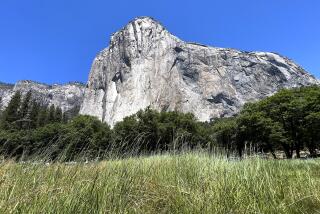Plan urged to save national parks from global warming effects
- Share via
The federal government must take decisive action to avoid “a potentially catastrophic loss of animal and plant life” in national parks, according to a new report that details the effects of global warming on the nation’s most treasured public lands.
The 53-page report from the National Parks Conservation Assn., a Washington-based advocacy group, details concerns related to climate change in the parks, including the bleaching of coral reefs in Florida and the disappearance of high-altitude ponds that nurture yellow-legged frogs in California.
The group called on the National Park Service to come up with a detailed plan and funding to adapt to temperature-related ecosystem changes.
“Right now, no national plan exists to manage wildlife throughout their habitat, which often is a patchwork of lands managed by multiple federal agencies, states, tribes, municipalities and private landholders,” wrote Thomas C. Kiernan, president of the conservation group.
A major climate bill passed by the House in June would allocate more than $500 million a year to natural resources adaptation under a proposed carbon-trading program. The Senate is drafting a companion bill, but the outcome of the legislation remains uncertain.
The survey by the conservation group reinforces recent testimony by President Obama’s nominee for park service director, Jon Jarvis. “Climate change challenges the very foundation of the national park system and our ability to leave America’s natural and cultural heritage unimpaired for future generations,” Jarvis told a House subcommittee.
He suggested that “national park units can serve as the proverbial canary in the coal mine, a place where we can monitor and document ecosystem change without many of the stressors that are found on other public lands.”
The report recommends adaptation strategies including the creation of wildlife corridors stretching from one park to another so that species can move unencumbered into cooler areas. It also recommends more effective limits on environmental hazards.
--
margot.roosevelt@ latimes.com
More to Read
Sign up for Essential California
The most important California stories and recommendations in your inbox every morning.
You may occasionally receive promotional content from the Los Angeles Times.











